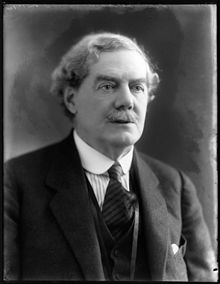
Summary
Charles Benjamin Bright McLaren, 1st Baron Aberconway, PC, KC, JP (12 May 1850 – 23 January 1934), known as Sir Charles McLaren, 1st Baronet, between 1902 and 1911, was a Scottish jurist and Liberal Party politician. He was a landowner and industrialist.
The Lord Aberconway | |
|---|---|
 | |
| Member of Parliament for Bosworth | |
| In office 4 July 1892 – 3 December 1910 | |
| Preceded by | James Ellis |
| Succeeded by | Henry McLaren |
| Member of Parliament for Stafford | |
| In office 3 April 1880 – 24 November 1885 | |
| Succeeded by | Thomas Salt |
| Personal details | |
| Born | Charles Benjamin Bright McLaren 12 May 1850 Edinburgh, Scotland |
| Died | 23 January 1934 (aged 83) London, England |
| Political party | Liberal |
| Spouse | |
| Children | 4 (including Henry, Francis and Priscilla) |
| Parent(s) | Duncan McLaren Priscilla Bright |
Early life and education edit
Born in Edinburgh, McLaren was the son of the politician Duncan McLaren and Priscilla Bright.[1] Priscilla was McLaren's third wife, and was the daughter of Jacob Bright and the sister of the Liberal statesman John Bright and temperance activist Margaret Bright Lucas. His full siblings included the Liberal MP Walter McLaren and the philanthropist Helen Priscilla McLaren, wife of Italian dietitian Andrea Rabagliati. Among McLaren's half-siblings were the judge John McLaren from his father's first marriage and the doctor Agnes McLaren from his father's second marriage.
McLaren was educated at Grove House School and then studied at the University of Heidelberg as well as the University of Bonn.[2] He finally graduated from the University of Edinburgh first class honours with a Master of Arts.
Political career edit
McLaren began his career in journalism, but turned to the law and in 1874, he was admitted to Lincoln's Inn as a barrister. In 1880, he was elected to the House of Commons as Member of Parliament (MP) for Stafford; he served that constituency until 1886. In 1892, he returned to the Commons as MP for Bosworth, which he represented until 1910.
McLaren's political career advanced during his second term, and in 1897 he was appointed a Queen's Counsel.[3] It was announced that he would receive a baronetcy in the 1902 Coronation Honours list published on 26 June 1902 for the (subsequently postponed) coronation of King Edward VII,[4] and on 24 July 1902 he was created a Baronet, of Bodnant, in the County of Denbigh.[5] He was sworn of the Privy Council in 1908, and held the office of Justice of the Peace in Middlesex, Flint, Denbighshire, and Surrey. In 1911, a year after he had left the Commons (his son replaced him), he was raised to the Peerage of the United Kingdom with the title Baron Aberconway, of Bodnant, in the County of Denbigh.
McLaren was decorated with the 3rd class of the Japanese Order of the Sacred Treasure and received the Serbian Order of the Cross of Takovo.[6] He was awarded a Commander of the Greek Order of the Redeemer.
Career in industry edit
His father-in-law, a noted industrialist, died in 1895, and McLaren became increasingly involved in the management of the companies inherited from him. He would become chairman of the Tredegar Iron and Coal Company and the British Iron Trade Association.[2] McLaren chaired also the London-based Metropolitan Railway Company and the shipbuilding firm John Brown & Company.[2]
Family edit
On 6 March 1877, McLaren married Laura, the daughter of the chemist Henry Davis Pochin and suffragist Agnes Heap, in Westminster; the couple had four children. He and his wife were neighbours and friends of James McNeill Whistler, owning several of his works.[7]
Laura died in 1933 and McLaren survived her until the following year. They are buried at a mausoleum called "The Poem" within Bodnant Garden, which became the traditional burial place of the Lords Aberconway.[8] On his death in 1934, in Belgrave Square in London, the barony and baronetcy passed to his eldest son, Henry. His second son Francis sat also in the Parliament of the United Kingdom, however was killed during the First World War in his father's lifetime. The older daughter Priscilla was a socialite as well as activist and married the journalist Sir Henry Norman, 1st Baronet. Her younger sister Elsie was the wife of Sir Edward Johnson-Ferguson, 2nd Baronet.
References edit
- ^ "LORD ABERCONWAY, INDUSTRIALIST,DIES; Sat in British Commons 1880 to 1910 -- Ha Distinguished Career as Barrister. SHIPBUILDING FIRM HEAD Chairman of Metropolitan Railway, Iron and Coal Operator and Large Land Owner". The New York Times. Retrieved 23 September 2020.
- ^ a b c Dod (1915), p. 39
- ^ "No. 26856". The London Gazette. 25 May 1897. p. 2928.
- ^ "The Coronation Honours". The Times. No. 36804. London. 26 June 1902. p. 5.
- ^ "No. 27457". The London Gazette. 25 July 1902. p. 4738.
- ^ Acović, Dragomir (2012). Slava i čast: Odlikovanja među Srbima, Srbi među odlikovanjima. Belgrade: Službeni Glasnik. p. 589.
- ^ "Charles Benjamin Bright McLaren, 1850-1934". University of Glasgow. Retrieved 10 January 2010.
- ^ National Trust Collections: Memorial to Charles Benjamin Bright McLaren, 1st Baron Aberconway, MP (1850-1934)
Sources edit
- Charles Roger Dod & Robert Phipps Dod (1915). Dod's Peerage, Baronetage and Knightage of Great Britain and Ireland for 1915. London: Simpkin, Marshall, Hamilton, Kent and Co. Ltd.
- Boyns, Trevor (28 September 2006) [2004]. "McLaren, Charles Benjamin Bright, first Baron Aberconway (1850–1934)". Oxford Dictionary of National Biography (online ed.). Oxford University Press. doi:10.1093/ref:odnb/34776. (Subscription or UK public library membership required.)
- thePeerage.com
External links edit
- Hansard 1803–2005: contributions in Parliament by Charles McLaren
- Portraits of Charles McLaren, 1st Baron Aberconway at the National Portrait Gallery, London


